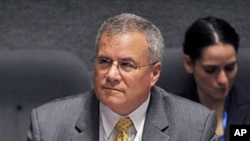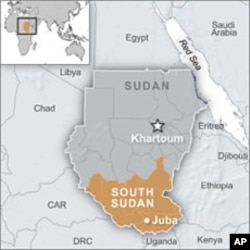U.S. Special Envoy Scott Gration says the peace process between North and South Sudan was "overshadowed" by the crisis in Darfur, causing the international community to shift its attention away from the 2005 Sudanese peace deal. An estimated two-million people died during the two-decade North-South civil war.
Speaking in Nairobi, U.S. Special Envoy to Sudan Scott Gration says the focus on North-South Sudanese peace relations suffered because of the Darfur crisis that broke out in 2003. A final Comprehensive Peace Agreement between the southern SPLM rebels and the northern ruling NCP party was signed in January 2005.
"Frankly we were pulled off message and off focus when Darfur happened, and Darfur sort of overshadowed what was happening in terms of implementation of the CPA," said Gration. "So things just sort of muddled along. Last June, we pulled together a conference for supporters of the Comprehensive Peace Agreement, and we started at that time talks," he said.
Gration's remarks have been matched by the private, and sometimes public, views of U.N. and aid officials based in Sudan's south, who say the international community's focus on Sudan's western region of Darfur has often come at the expense of the southern Sudanese people.
In a January interview with VOA, U.N. Deputy Resident and Humanitarian Coordinator in South Sudan Lise Grande said South Sudan humanitarian operations received only one-fifth the funds allotted to Darfur last year.
"If you have such desperate social, economic, and humanitarian conditions, and you have so little money to address them, this is why we say what we say - that we had a fraction of the money which is going to Darfur," said Grande.
About 300,000 people are thought to have died in Darfur since 2003 during a counter-insurgency campaign in which Khartoum enlisted proxy Arab militias that have terrorized the mostly black-African population of the region. The people of Darfur say the region has suffered from severe economic and political marginalization.
An average of 100,000 people a year, mostly Southerners, are thought to have been killed during the North-South civil war, fought over issues of religion, race, political ideologies, and oil.
The U.S. special envoy to Sudan traveled to Kenya to attend a special summit on Sudan organized by IGAD, a bloc of Horn of African nations that was instrumental in forging the original peace deal.
Speakers at the conference warned that a number of outstanding issues threaten the final implementation of the peace deal, which is to culminate in a Southern secession referendum scheduled less than one year from now.
The sides have yet to fully agree on where the North-South border lies, and no deal has been struck on revenue from Southern oil fields or on Sudan's sizable foreign debt.
Southern officials have on many occasions warned that a return to war would be imminent if they are denied their self-determination portion of the 2005 CPA. Most expect Southerners to overwhelmingly vote for independence if given the chance.
Sudanese President Omar Hassan al-Bashir, as well as other top Khartoum officials, has recently stated publicly that the South's choice in the poll will be respected.
Gration said he was encouraged by the increasing involvement of Sudan's neighbors in the peace process. He said a viable independent South will only be possible if ties in the region are strengthened.
"IGAD countries and the bordering countries on the south are going to have to increase significantly their communication and transportation links and trade with the South [Sudan]," he said. "I think that in order for the South to be successful, it is going to have to maintain and build on the relationship it has with the North, and it is going to have to strengthen the relationship that it has with [countries to] the south," he added.
A recent national census put Darfur's population at 7.5 million and that of South Sudan's at more than 8 million, though the counting has been criticized by some as highly flawed.





